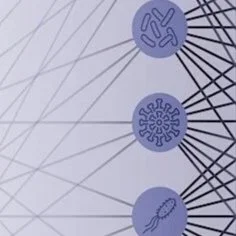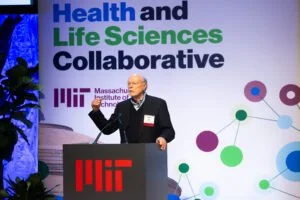July Bulletin
Issue 70
Community Notices
July Research Seminar
Next Marble Center seminar is on Monday July 25th, 4-5pm at the KI Luria Auditorium with a research update on engineering RNA vaccines for immunotherapy by Dr. B.J. (Byungji) Kim of the Irvine Lab. Following the research update, we will host a guest hot topic presentation on Nature Reviews Bioengineering (launching January 2023) by Dr. Christine Horejs, Chief Editor at Nature Portfolio.
For those who prefer to join remotely, the Zoom link will be provided upon request (please email Tarek Fadel at tfadel@mit.edu). Following the seminar, please join us for a social with food and drinks (starting at 5:00pm).
Annual Reports and RFP
This year’s internal Marble Center RFP was issued on June 30, 2022. Please check with your PI or laboratory representative for more information.
Deadline for this year’s RFP is Friday July 22, 2022. If you have any questions, please contact Tarek Fadel (tfadel@mit.edu).
In the News
Nanoparticle sensor can distinguish between viral and bacterial pneumonia
(Anne Trafton | MIT News Office) MIT researchers have now designed a sensor that can distinguish between viral and bacterial pneumonia infections, which they hope will help doctors to choose the appropriate treatment.
“The challenge is that there are a lot of different pathogens that can lead to different kinds of pneumonia, and even with the most extensive and advanced testing, the specific pathogen causing someone’s disease can’t be identified in about half of patients. And if you treat a viral pneumonia with antibiotics, then you could be contributing to antibiotic resistance, which is a big problem, and the patient won’t get better,” says Sangeeta Bhatia, the John and Dorothy Wilson Professor of Health Sciences and Technology and of Electrical Engineering and Computer Science at MIT and a member of MIT’s Koch Institute for Integrative Cancer Research and Institute for Medical Engineering and Science. Read more…
MIT researchers have designed a sensor that can distinguish between viral and bacterial pneumonia infections. In the background, depictions of viruses are on the left, and bacteria on the right. Credits: Image: Jose-Luis Olivares, MIT, and iStockphoto
Instigators of Change: Angela Belcher on cancer, green synthesis, and getting inventions to market
About a decade ago, when the President of MIT approached Angela Belcher about doing cancer research, Belcher turned her down. After all, Belcher is a materials and biological engineer who had done lots of work on environmental sustainability. But cancer research? That was an area she didn't feel she could contribute to. And then she realized that a new, interdisciplinary approach to cancer - involving some of the best scientists and clinicians in the world - might be able to move the needle. Khosla Ventures talk with Belcher about how this new approach is changing cancer research, how breakthrough work in engineering could affect how we fight biological weapons, and the challenges of getting new inventions to market.
Engineers develop nanoparticles that cross the blood-brain barrier
A team of MIT researchers is now developing drug-carrying nanoparticles that appear to get into the brain more efficiently than drugs given on their own. Using a human tissue model they designed, which accurately replicates the blood-brain barrier, the researchers showed that the particles could get into tumors and kill glioblastoma cells.
Many potential glioblastoma treatments have shown success in animal models but then ended up failing in clinical trials. This suggests that a better kind of modeling is needed, says Joelle Straehla, the Charles W. and Jennifer C. Johnson Clinical Investigator at MIT’s Koch Institute for Integrative Cancer Research, an instructor at Harvard Medical School, and a pediatric oncologist at Dana-Farber Cancer Institute. Read more…
MIT researchers have created a tissue model that allows them model drug delivery to brain tumors. Tumor cells (green) are surrounded by endothelial cells (purple). Credits: Image: Cynthia Hajal and Roger D. Kamm (MIT), edited by Chris Straehla.
Robert Langer wins BBVA Foundation Frontiers of Knowledge Award
Robert Langer, the David H. Koch (1962) Institute Professor at MIT, received yesterday the 2022 BBVA Foundation Frontiers of Knowledge Award in Biology and Biomedicine in recognition of his contributions to messenger (mRNA) therapeutics and delivery technology, which enabled the rapid development of SARS-CoV-2 vaccines.
Langer shares the award with Katalin Karikó and Drew Weissman, both of the University of Pennsylvania. Karikó and Weissman discovered how to modify mRNA molecules so that they could be used as a therapeutic agent, while Langer developed the first approaches of nanoparticle encapsulation that allows mRNA to be introduced into the body. Read more…
Left to right: Robert Langer, Drew Weissman, and Katalin Karikó receive the 2022 Foundation Frontiers of Knowledge Award in Biology and Biomedicine. Credits: Photo: BBVA Foundation
Jobs
Scientist, RNA Molecular Biology, Antisense Platform, Alloy Therapeutics.
Alloy Therapeutics is seeking a scientist to advance their novel antisense platform to create precision medicines. Alloy is looking for people with expertise in RNA/DNA molecular biology and various biochemical, molecular, and cellular assays. This is a unique opportunity to be part of an experienced and talented team advancing novel antisense chemistry modalities for therapeutics. Read more...
Senior Scientist, Delivery Formulation, Sanofi.
Sanofi is seeking a highly motivated and scientifically rigorous individual to join the Delivery Formulations team as a Senior Scientist. The position will focus on developing novel delivery systems for mRNA delivery and formulation development activities in the group with applications towards vaccine development. Read more…
Funding opportunities
| Funding Source | Grant ID | Deadline | Convergent Science Cancer Consortium Development Award | N/A | August 17, 2022 | Toward Translation of Nanotechnology Cancer Interventions | PAR-22-071 | November 17, 2022 |
|---|






